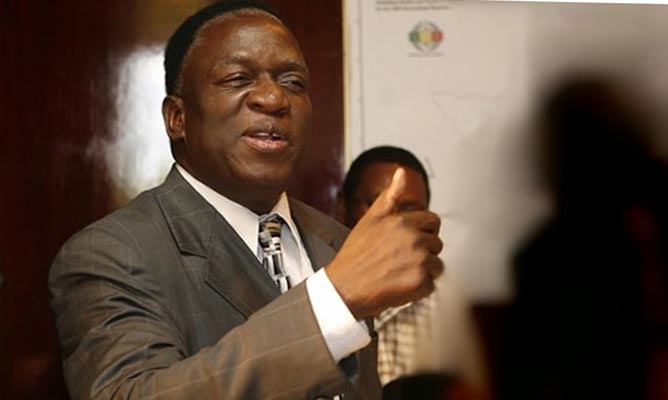
Vice-President Emmerson Mnangagwa faces an acid test tomorrow when the Supreme Court hears an appeal against a ruling that sought to stop the Judicial Services Commission (JSC) from rolling out a process to find Chief Justice Godfrey Chidyausiku’s successor, with a group of lawyers now arguing that the veteran politician’s interventions violated the Constitution.
BY EVERSON MUSHAVA
Bulawayo-based Abammeli Bamalungelo Abantu last week approached the Supreme Court seeking to be included in the case as an “intervener” and wants an order stopping Mnangagwa from allegedly violating the supreme law.
In its heads of argument, Abammeli chastised Mnangagwa for allegedly presiding over the breach of the Constitution, which his office as Justice minister, according to section 2 of the Constitution should safeguard.
Abammeli said its objectives and activities included, among other things, the promotion and protection of human rights and the rule of law in Zimbabwe.
The group of lawyers argued that Section 180 of the Constitution that spelt out the appointment of the chief justice in a very clear and unambiguous way remained binding even in the face of amendments to the provision.
“The third respondent [Mnangagwa], who doubles up as the Minister of Justice, has a duty to uphold the Constitution and ensure that its obligations are fulfilled as is required by section 2(2) of the Constitution,” Abammeli submitted.
“In fact, it is submitted that the third respondent is conflicted in that, on one hand, he is the mover of the Amendment Bill and seeks to have the constitutional clause in section 180 suspended in respect of the chief justice.
- Chamisa under fire over US$120K donation
- Mavhunga puts DeMbare into Chibuku quarterfinals
- Pension funds bet on Cabora Bassa oilfields
- Councils defy govt fire tender directive
Keep Reading
“The third respondent on the other hand was supposed to provide leadership in the upholding of the Constitution and ensuring fulfilment of its provisions as is required by section 2 of the Constitution.”
Abammeli added: “Orders therefore should be made as indicated in the notice of motion so that this kind of conduct is not repeated by any juristic or natural person. Public officers and individuals have a duty in terms of section 2(2) to fulfil the obligations imposed by the Constitution.
“These orders should be made in respect of the conduct of the third respondent as well as that of the judge in the court a quo.”
The lawyers said they would submit that setting aside provisions of the Constitution, basing on an impending constitutional amendment, was in violation of section 2 of the Constitution.
“Such a violation is of a serious nature since it poses a threat to the rule of law, which is at the core of our democracy,” Abammeli argued.
Chidyausiku will retire on February 28 and the appointment of his successor has been shrouded in controversy, with a Zanu PF faction accusing Mnangagwa of trying to influence the process as part of the battle to succeed Mugabe.
The appointment of Zimbabwe’s next chief justice was thrown in turmoil late last year after the High Court granted an order to University of Zimbabwe law student, Romeo Taombera Zibani to halt the public interviews for judges aspiring to fill the post as required by section 180 of the Constitution.
Mnangagwa filed an affidavit supporting Zibani’s application on the grounds that his Justice ministry was working on amending the Constitution to give Mugabe the sole responsibility to handpick the chief justice.
However, the interviews led by Chidyausiku went ahead after the JSC noted an appeal with the Supreme Court.
The interviews were attended by three judges — Deputy Chief Justice Luke Malaba, Justice Rita Makarau and Justice Paddington Garwe, while judge president Justice George Chiweshe boycotted the process.










